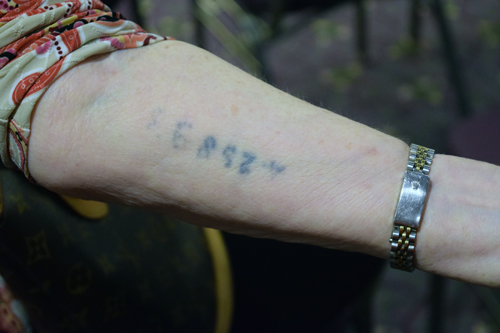
By Donald H. Harrison

SAN DIEGO – One of the nightmarish questions we Jews ask ourselves is “After all the Holocaust survivors have passed on, who will tell their stories?” Following a Havdalah service on Saturday night at Tifereth Israel Synagogue, a group of pre-teens and teens affirmed in unison: “When they are gone, we are their voice!”
The occasion was a Yom Hashoah observance that brought together members of the Conservative synagogue’s Men’s Club, Sisterhood, New Life Club, United Synagogue Youth, and 7th grade B’nai Mitzvah Class for a presentation of poetry, prose, dance and remembrance.
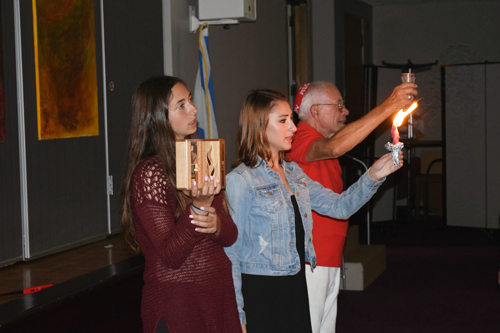
The Havdalah service led by Men’s Club Religious Action Chair Norman Katz symbolized the separation of the sacred (Shabbat) from the profane (the rest of the week). It was a fitting prelude to the Yom HaShoah commemoration because no period in history has been less sacred or more profane than the Holocaust.
A speech was given by Roxanne Schindler Katz, daughter of New Life President Rose Schindler, who had survived the Auschwitz Concentration Camp, and of the late Max Schindler, who had survived six other Nazi-run forced labor and concentration camps.
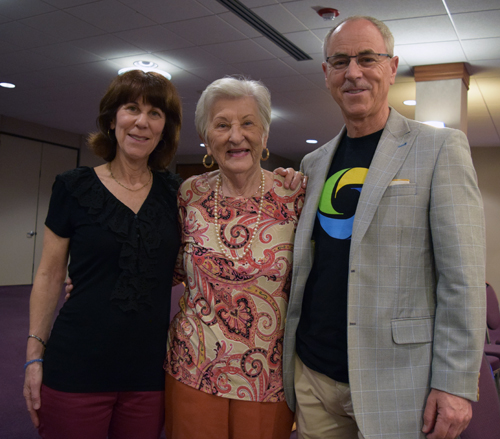
Roxanne Schindler Katz explained that the New Life Club had been formed after World War II by the first group of Holocaust survivors to arrive in San Diego. Members “formed a tight-knit community, where families socialized with each other, often every weekend,” she said.
Now, 60 years later, the number of club members has diminished greatly. “What will happen when there are no more New Life Club members to speak to us about their experiences in the Holocaust?” Roxanne Schindler Katz asked the assembled audience of more than 70 persons. “Who will speak for them? Will you continue to teach your children about the Holocaust and remind our politicians about the danger of complacency in the face of hate speech and bigotry? … Let us honor those who are still with us today, and the memory of those we have lost, with our commitment to never forget.”
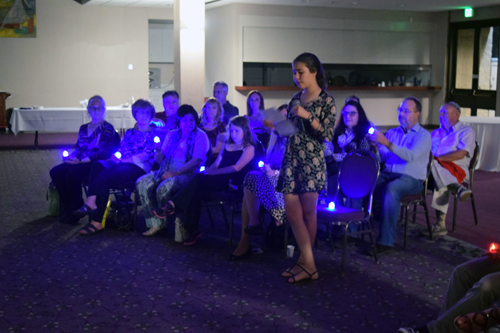
The audience was seated in four sections in Tifereth Israel Synagogue’s Cohen Social Hall. Battery operated lights of red, blue, white, and green were distributed, with each section receiving one of these colors. Then as four members of United Synagogue Youth read poems in succession, the colored lights were switched on for the respective readings. Red lights symbolized “the blood shed by six million at the hands of the Nazis.” Blue: “The sadness after the world learned the tragic extent of the Holocaust.” Gold: “The golden glow of Yerushalayim and the survivor’s reflection on what might have been.” Green: “Hope and rebirth of the Jewish people.”
Maya Klareich read “Merciful God,” the “red” poem by Kadya Molodowsky. It said, in part:
Merciful God,
Choose another people,
Elect another.
We are tired of death and dying
We have no more prayers.
Choose another people.
Elect another
We have no more blood
To be a sacrifice.
Our house has become a desert
The earth is insufficient for our graves.
No more laments for us.
No more dirges
In the old, holy books.
Arielle Sherbak followed with the “blue” poem, “Refugee Blues” by WH Auden. It began:
Say this city has ten million souls,
Some are living in mansions, some are living in holes
Yet there’s no place for us, my dear, yet there’s no place for us.
Once we had a country and we thought it fair.
Look in the atlas and you’ll find it there.
We cannot go there now, my dear, we cannot go there now.
Max Matkovski recited the “gold” poem by Israel Emiot:
Had my mother lived, by now she’d surely be
An old Jewish woman with hair white as snow;
Even through spectacles she would not see
The difference between dream and what is so.
An old, old mother, with nothing left to do,
Feet propped on a stool, a princess on her throne;
But whatever you’re up to, she’d be right there with you
–and your whole life comes from her alone.
“Momma, the table waits for you,” I’d say.
As portraits crown walls, she’d crown each holiday.
And if she drowsed, I’d gently take her hand
And off we’d wander to her golden land.
The final “green” poem, “Tikvatenu,” by Naftali Herz Imber was recited by Ilan Matkovski.
Our home is not yet lost,
The ancient hope,
To return to the land of our fathers;
The city where David encamped.
As long as in his heart within,
A soul of a Jew still yearns,
And onwards towards the ends of the east,
His eye still looks toward Zion.
Our hope is not yet lost,
The hope that is two thousand years old,
To be a free nation in our land,
The Land of Zion, Jerusalem.
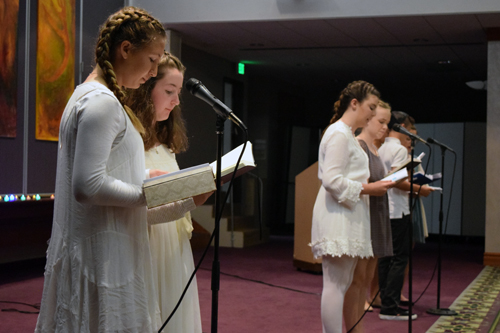
Next, under the direction of community teacher Lili Feingold, stories depicting the various, heartbreaking stages of the Holocaust—restrictive laws against the Jews, ghettoization, forced labor, murder – were read from We Are Their Voice, a collection of stories written in the voices of Holocaust victims and survivors by 8th graders in multi-religious parochial and secular schools throughout North America.
Too long to reproduce here, the dramatic, often emotional stories were read by Tifereth Israel’s b’nai mitzvah students Ruby Anderson, Miranda Assef, Brandon Kulis, Cindy Lackenbacker, Sydney Levenson, Marisa Nowicki, and Gaby Randall.
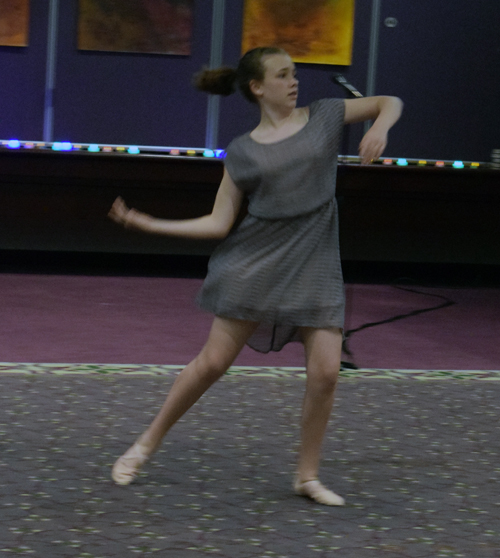
Then, symbolizing transition from the despair of the Holocaust to the joy of the establishment of Israel, Ruby Anderson performed a modern dance in which her leaps and accompanying hand movements grew increasingly more energetic and life affirming.
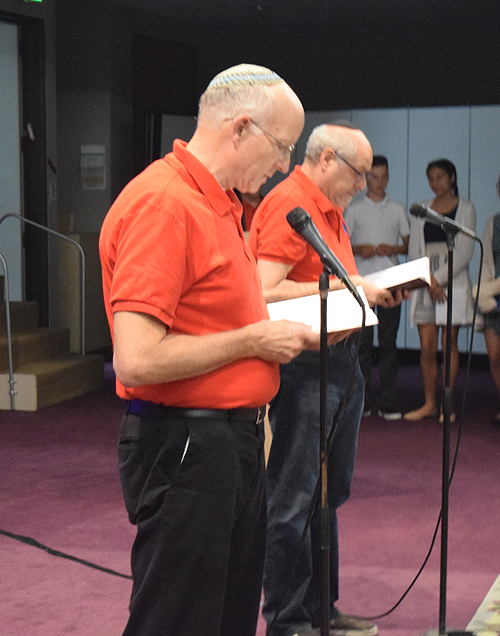
The Yom HaShoah observance concluded with the recitation of the Kaddish prayer, in Hebrew and in English, led respectively by Men’s Club members Phil Lorang and Alan Goldenberg, both wearing the club’s red shirts.
And how did such an evening end? Bill Sperling, president of the Men’s Club, announced that thanks to the effort of the Sisterhood, dessert in the form of ice cream cakes, was now being served at the back of the Social Hall.
Snacking and schmoozing lightened the mood; a community that had mourned together now derived sustenance from each other’s companionship!
*
Harrison is editor of San Diego Jewish World. He may be contacted via donald.harrison@sdjewishworld.com